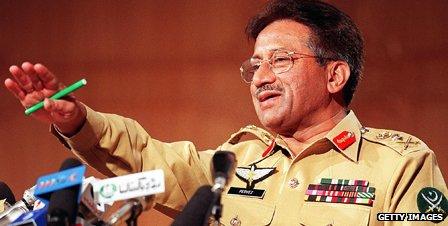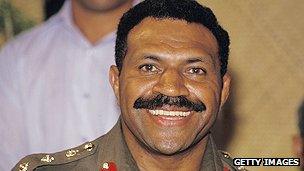Profile: Commonwealth of Nations - Timeline
- Published
A chronology of key events:
1926 - Imperial Conference: UK and its dominions agree they are "equal in status, in no way subordinate one to another in any aspect of their domestic or external affairs, though united by common allegiance to the Crown, and freely associated as members of the British Commonwealth of Nations."

The Commonwealth has sanctioned members several times, including Pakistan following a coup staged by Pervez Musharraf
1930 - First Commonwealth Games held in Hamilton, Canada.
1931 - British parliament enacts the Statute of Westminster, which proclaims the Commonwealth a free association of self-governing dominions united by a common allegiance to the British Crown.
1948 - Ireland leaves the Commonwealth on becoming a republic.
1949 - Commonwealth prime ministers issue the London Declaration, which changes membership from one based on common allegiance to the British Crown to one in which members agree to recognise the British monarch as head of the Commonwealth, rather than as their head of state.
1961 - South Africa withdraws from the Commonwealth after it is criticised by many members for its apartheid policies.
1965 - Commonwealth Secretariat set up in London.
1971 - Singapore Declaration of shared principles is adopted; it includes commitments to individual liberty, freedom from racism, peace, economic and social development, and international cooperation.
1972 - Pakistan leaves the Commonwealth in protest at the latter's recognition of Bangladeshi independence. Rejoins in 1989.
1977 - Adoption of Gleneagles Agreement discouraging sporting contacts with South Africa because of its apartheid policies.
1979 - Lusaka Declaration on Racism and Racial Prejudice issued.
1987 - Fiji suspended from Commonwealth following the overthrow of its government.
1989 - Pakistan rejoins.

Sitiveni Rabuka led the coup in Fiji which prompted its suspension from the Commonwealth
1991 - Harare Declaration adds democracy, good government and human rights to the Commonwealth's shared principles.
1994 - South Africa rejoins the Commonwealth following the end of apartheid.
1995 - Commonwealth Ministerial Action Group (CMAG) set up to deal with persistent and serious violators of the Commonwealth's shared principles; Nigeria suspended from the Commonwealth after it sentenced to death the writer Ken Saro-Wiwa and a group of fellow activists.
1997 - Fiji reinstated after it adopts new constitution more in line with Commonwealth's shared principles.
1999 May - Nigeria reinstated after its return to civilian rule.
1999 October - Pakistan suspended because of military take-over.
2000 - Fiji suspended again after a coup by rebel leader George Speight. It is readmitted in December 2001.
2001 October - Commonwealth ministers visiting Zimbabwe say they think the government has done little to honour commitments to end a crisis over seizures of white-owned land.
2002 March - Zimbabwe is suspended for a year over President Robert Mugabe's controversial re-election. A Commonwealth observer group had strongly condemned the conduct of the poll, though observers from other African countries endorsed the elections as "transparent, free and fair".
2003 March - Zimbabwe's suspension extended to December 2003.
2003 December - Zimbabwe's suspension extended indefinitely. Zimbabwean government responds by announcing country is pulling out of Commonwealth for good.
2004 May - Pakistan readmitted.
2006 December - Fiji suspended from attending Commonwealth meetings over a military coup.
2007 November - Pakistan is suspended for a second time after President Musharraf declares a state of emergency and sacks top judges.
2008 May - Pakistan's suspension is lifted; Commonwealth Ministerial Action Group says the government has taken positive steps to fulfil its obligations.
2009 September: Fiji fully suspended from membership after military ruler refuses to schedule elections for 2010.
2009 November - Rwanda joins the Commonwealth after applying for membership in 2008. Despite having no historical ties to Britain the country was allowed in as recognition of its "tremendous progress" since the genocide of 1994, the Commonwealth Secretariat said.
2011 November - The British parliament's foreign affairs select committee recommends better representation for Crown Dependencies such as the Channel Islands in the Commonwealth.
2012 January - The Commonwealth calls for credible elections in Fiji, after military ruler Voreqe Bainimarama announces plans to end martial law and hold elections in 2014. Fiji remains suspended from the Commonwealth and is the subject of international sanctions.
2012 December - The Commonwealth adopts its first-ever formal charter, committing members to 16 core values of democracy, gender equality, sustainable development and international peace and security.
2013 October - Gambia announces its withdrawal from the Commonwealth.
2013 November - Member countries are urged to boycott the Commonwealth Heads of Government Meeting (CHOGM) in Sri Lanka in November because of the host's human rights record.
At the summit, Sri Lanka and Britain clash over how to deal with allegations of war crimes at the end the Sri Lankan civil war but a final communique makes no mention of the controversy.
2014 April - Canada says it is suspending twenty million dollars in funding to the Commonwealth while Sri Lanka chairs the group, because of human rights concerns in that country.
2014 September - Fiji re-instated as a member after holding parliamentary elections.